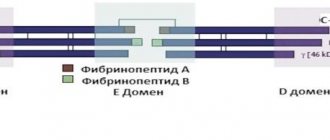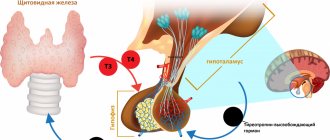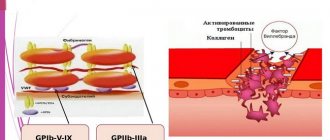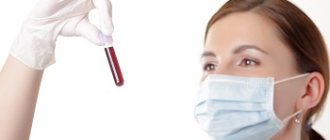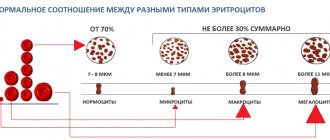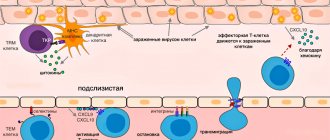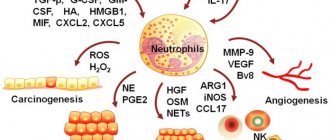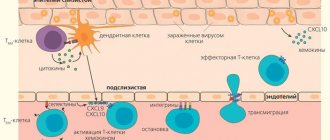Adrenal glands
- a pair of endocrine glands that are adjacent to the kidneys at the level of the 6th-7th thoracic vertebra. They have a complex zonal structure, in which they delimit the medulla, strawberry, fascicular, and reticular zones of the cortex. Zone cells produce hormones with different functions:
- adrenaline norepinephrine - take part in regulating the activity of the cardiovascular system;
- aldosterone—takes part in the regulation of water-salt metabolism;
- cortisol—regulates fat, protein, and carbohydrate metabolism;
- androgens—affect sexual development and sexual identification.
Go to analyzes
The normal functioning of the adrenal glands can be disrupted by infections, tumors, autoimmune diseases, genetic disorders, and drug treatment. This leads to a deficiency or excess of adrenal hormones, which, in turn, is the cause of local malfunctions in the body, which gradually become systemic and threaten not only health, but also human life.
The role of adrenal hormones is so important that the scientists who discovered their role in the body - E. Kendall, F. Hench, T. Reichstein - were awarded the Nobel Prize in Medicine and Physiology.
Cortisol
Cortisol, or compound F, is produced by the zona fasciculata of the adrenal cortex. Its synthesis is a chain of transformations from cholesterol to pregnenolone, then to progesterone, corticosterone, which develops into cortisol.
Cortisol is an active participant in protein, lipid, and carbohydrate metabolism. It forms glycogen reserves in the liver - “energy in reserve”, affects the synthesis of cellular enzymes, water-salt balance. Almost every cell has receptors for cortisol, so its effect on the body is extensive and pronounced.
Cortisol is called the stress hormone because it forms a protective response to external threats and is responsible for:
- increased blood pressure;
- increased heart rate;
- vascular tone;
- muscle function (reduces glucose consumption in muscles and borrows it from other organs).
All these reactions are aimed at physical work - running, wrestling and the like, i.e. they remained at the level of ancient man. However, modern people cannot escape stress by running away, because glucose accumulates in the muscles, which threatens the development of diabetes. At the same time, the organs that gave up glucose “starve” - and the person begins to eat more sweets and starchy foods, which leads to obesity.
Cortisol lowers the number of white blood cells in the blood. This leads to a weakened immune response, which is good for allergic reactions, but bad for wound healing and inflammatory processes.
Scientists have identified a connection between the level of the hormone and a whole group of unstable mental conditions, for example, depression and anxiety. High levels of the hormone over a long period of time lead to the extinction of sexual desire, and in women, to disruption of menstruation and even its complete cessation.
Reasons for abnormal cortisol levels
A decrease or increase in cortisol levels can be caused by many reasons. Thus, a low level is the cause of problems with the pituitary gland or the adrenal glands themselves, the thyroid gland, with hepatitis and cirrhosis of the liver.
High levels can be caused by tumors that produce adrenocorticotropic hormone, pathologies of the thyroid gland, certain types of medications, and cirrhosis of the liver. An increase in level occurs with depression and uncompensated diabetes mellitus.
Consequences, symptoms of persistently elevated, high levels of cortisol:
- central obesity with thin arms and legs;
- thin skin with a tendency to bruises;
- muscle weakness, especially in the shoulders and hips;
- high blood pressure;
- diabetes mellitus or glucose intolerance;
- reddened, rounded face;
- unmotivated or poorly motivated mood swings;
- increased thirst and frequent urination.
Consequences, symptoms of low, low cortisol levels (increase gradually):
- fatigue and dizziness;
- weight loss;
- muscle weakness;
- change in color in certain areas of the skin (darkening).
Important!
Low cortisol levels (Addison's disease) are potentially life-threatening and require urgent examination by an endocrinologist.
Normal cortisol level in a calm state, deviations:
- in the morning - 101.2–535.7 nmol/l;
- in the evening - 79.0–477.8 nmol/l;
- in pregnant women in the 3rd trimester - 2-5 times higher than the usual norm;
- in stressful and critical situations - up to 10 times higher than normal.
How to submit biomaterial and prepare for research
The hormone level is determined by a general/biochemical blood test and urine test. You need to donate blood for cortisol testing in the morning (before 10 o’clock), on an empty stomach - the last meal should take place 8 or more hours before blood sampling. On the day before donating blood, you should avoid psycho-emotional, physical stress, and drinking alcohol.
The reliability of the diagnosis requires several tests to exclude random increases/decreases caused by external factors. If the hormone level is potentially high, blood is also donated in the evening, after 17:00, following the same recommendations as in the morning.
A urine test for cortisol levels is usually done to diagnose adrenal function. For research, take up to 120 ml of volume collected during the day.
The result of the blood test is provided after 24 hours, if urgently necessary - after 2-3 hours; urine tests - after 3-5 days. The speed of research depends on the workload and equipment of the laboratory. The accuracy of the results is high.
Complexes with this research
Advanced female anti-aging diagnostics Advanced monitoring of key blood parameters in a woman aged 40+ 28,680 ₽ Composition
Male anti-aging diagnostics Monitoring of key parameters in a man aged 40+ 13,300 ₽ Composition
Metabolic profile 5,900 ₽ Composition
IN OTHER COMPLEXES
- Advanced anti-aging diagnostics in postmenopause RUB 29,230
- Female infertility RUB 16,210
- Adrenogenital complex RUB 2,560
- Three important indicators for a man RUB 1,810
- Preventative check-up RUB 11,960
Aldosterone
Aldosterone is a steroid hormone. Its main function is to regulate salt and water levels in the body, whose levels directly affect blood pressure.
The hormone acts on the kidneys and colon, increasing the amount of sodium reabsorbed into the bloodstream and sodium excreted in the urine. Aldosterone causes the reabsorption (reabsorption) of water along with sodium, which increases blood volume and with it blood pressure.
Aldosterone is part of the renin-angiotensin-aldosterone group of related hormones. The system is activated if blood flow to the kidneys decreases. Aldosterone increases the reabsorption of salt and water from the kidneys into the bloodstream, thereby increasing blood volume, restoring salt levels and blood pressure.
Reasons for changes in aldosterone levels
The most common cause of high hormone levels is overproduction caused by primary hyperaldosteronism (Conn's syndrome). The syndrome develops against the background of diffuse edema, adrenal hyperplasia or a small, always benign tumor in the gland (adrenal adenoma). Sometimes hyperaldosteronism is a hereditary disease.
Consequences, symptoms of elevated aldosterone levels:
- an increase in blood volume above normal;
- low level of potassium in the blood (about 1/3 of subjects with hyperaldosteronism);
- high blood pressure - in this case it does not respond to several drugs to regulate blood pressure;
- in some cases - convulsions, severe thirst, weakness.
Consequences, symptoms of low aldosterone levels:
- decreased blood pressure;
- lethargy;
- increased potassium levels in the blood.
Aldosterone levels for people over 15 years of age (not established for children and adolescents):
- 22.1 – 353 pg/ml in a vertical position;
- 2.8 – 39.9 µIU/ml in a horizontal position;
- less than 12 pg/μIU—aldosterone-renin ratio (ARR).
The Russian Association of Endocrinologists recommends diagnosing primary hyperaldosteronism when APC ≥ 50; in international practice - with APC ≥ 30.
To confirm the diagnosis, a repeat study is required, since there are many factors that lead to false positive and false negative results. Among them are hyperkalemia, drug effects, renal failure, hypokalemia, pregnancy and others.
How to submit biomaterial and prepare for research
Approximately 2 weeks to a month before the study, you need to adhere to a low-carbohydrate diet, do not take diuretics, antihypertensive drugs (after consultation with a doctor), oral contraceptives, steroid drugs, estrogens.
A week before the study, stop taking renin inhibitors. In 3 days, physical and psycho-emotional stress is eliminated. And 3 hours before donating blood you need to refrain from smoking.
References
- Belaya, Zh.E., Rozhinskaya, L.Ya., Melnichenko, G.A. Modern view on screening and diagnosis of endogenous hypercortisolism. Problems of endocrinology, 2012. - V. 4. - P. 35-41.
- Federal clinical guidelines. Itsenko-Cushing's disease: clinical picture, diagnosis, differential diagnosis, treatment methods. Russian Association of Endocrinologists, 2014.
- Wilson, D. McGraw-Hill Manual of Laboratory and Diagnostic Tests 1st Ed Normal, 2007.
- Dorn, L., Lucke, J., Loucks, T. et al. Salivary cortisol reflects serum cortisol: analysis of circadian profiles. Ann Clin Biochem, 2007. - Vol. 44(3). — P. 281-84.
- Nicolson, N. In L. J. Luecken and L. C. Gallo. Measurement of Cortisol. In: Handbook of Psychological Research Methods in Health Psychology. Sage Publications, 2008, pp. 37–74.
Dehydroepiandrosterone
Dehydroepiandrosterone (DHEA) is a precursor hormone to testosterone and estradiol. It is produced from cholesterol in the outer layer of the adrenal glands and circulates in the blood, attaching to sulfur in the form of dehydroepiandrosterone sulfate to prevent the breakdown of the hormone.
In women, dehydroepiandrosterone is an important source of estrogens in the body: it provides about 75% of estrogens before menopause and 100% of estrogens in the body after menopause.
Recent scientific research shows that DHEA improves insulin sensitivity, cellular immunity, bone metabolism, sexual function, physical strength, neuroprotection, cognitive function and memory. Normal hormone secretion also means a young, healthy, attractive appearance of a man and woman, their sexual attractiveness and activity.
With age, the level of the hormone decreases - this is taken into account in the study.
Reasons for changes in dehydroepiandrosterone levels:
- benign and malignant tumors of the adrenal glands;
- adrenal hyperplasia;
- pituitary tumors;
- polycystic and other ovarian pathologies.
Consequences, symptoms of elevated levels of dehydroepiandrosterone:
- absence of menstruation;
- male pattern hair growth in women;
- lots of pimples;
- hair loss;
- problems with conceiving and bearing children;
- in men - baldness;
- in women - abnormally small breasts, enlarged Adam's apple;
- in children - early sexual development, including extremely early appearance of secondary sexual characteristics (hair) in the pubic area and under the arms.
Consequences, symptoms of low levels of dehydroepiandrosterone:
- diabetes;
- dementia;
- low sexual desire or its complete absence;
- osteoporosis, weakened bones;
- lupus;
- chronic fatigue syndrome;
- pathological decrease in immunity.
How to submit biomaterial and prepare for research
Venous blood is donated for testing. 2 hours before blood sampling, do not smoke or eat; if necessary, you can drink clean water without gas.
In 2 days - after consultation with a doctor! - do not take steroid or thyroid hormones; if possible, avoid physical and psycho-emotional stress.
Indicators for verification
Checking the level of hormonal substances in the female body is prescribed:
- to monitor pregnancy;
- identifying the source of disturbances in the menstrual cycle - with oligomenorrhea;
- registration of early puberty in teenage girls;
- determining the causes of abnormal body hair growth.
General indications for identifying indicators of hormonal balance are presented:
- pathological processes in bone tissue, including osteoporosis;
- the appearance of pigment spots in the area of skin folds, on the mucous membrane, areas of contact of the dermis with clothing or in open areas;
- development of colorless spots on the skin – depigmentation;
- bronze color of the dermis - a symptom of Addison's disease;
- stripes of red or purple hue that occur with Cushing's disease;
- muscle weakness – if the problem continues for a long time;
- acne in adult patients;
- weight loss without good reason.
Cortisol testing may be prescribed if blood pressure is elevated and the cardiovascular system is functioning normally.
Where to get tested
The network of medical centers and laboratory terminals of SZTsDM JSC covers St. Petersburg, Novgorod, the Leningrad region, Kaliningrad, Pskov.
To find the branch closest to you, use the drop-down menu on the top bar, interactive map or table. In the menu and on the map, you can click on the selected object - and you will receive complete information about the location, hours and days of reception. The map can be opened in YandexMaps to conveniently calculate the route.
In any department you will be greeted by qualified and attentive staff, sterile cleanliness, and you will be provided with a modern level of service and diagnostics.
We invite you to undergo research on the level of adrenal hormones at SZTSDM!
Remember that early detection of a problem is the key to complete and rapid success in identifying it. Be healthy!
